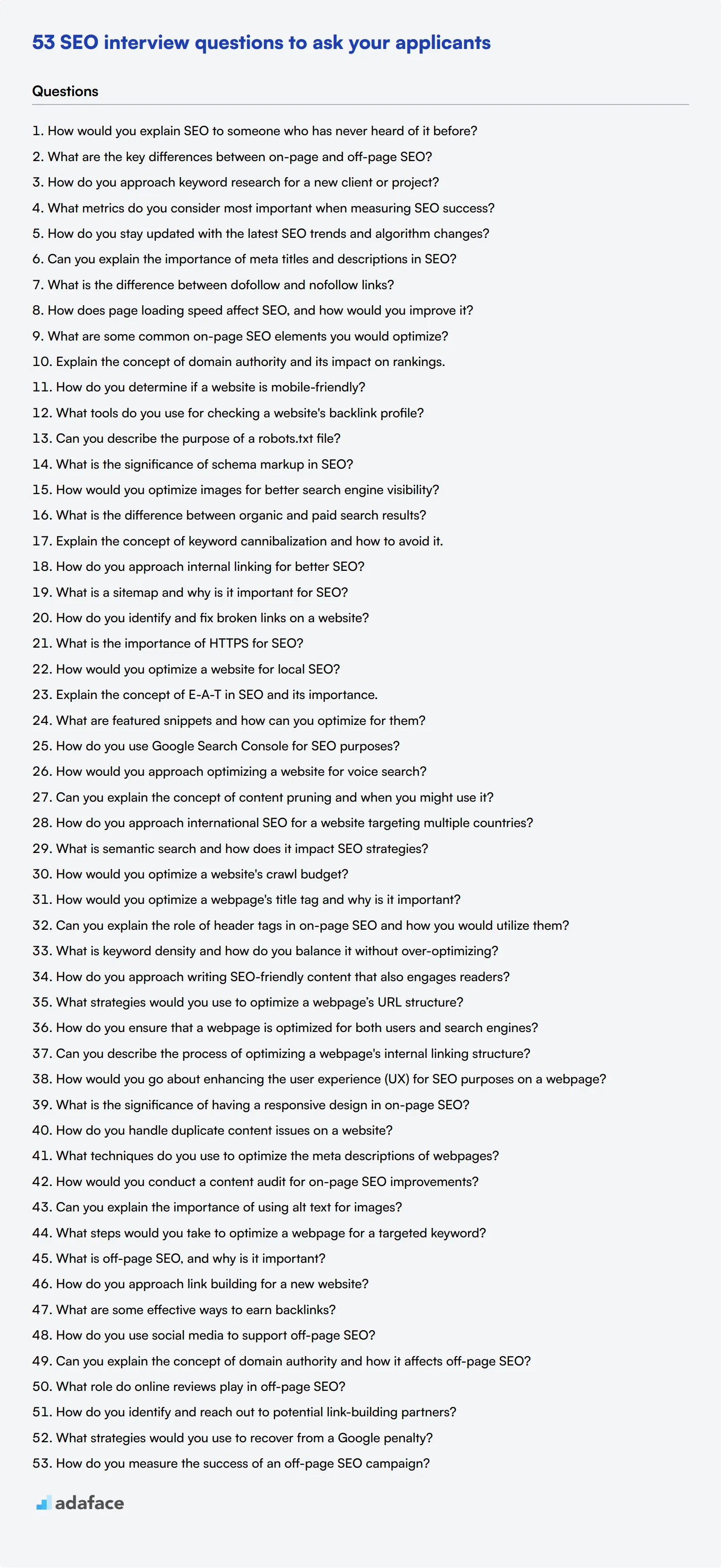Finding the right SEO specialist can be a game-changer for your company's online visibility and growth. By asking the right interview questions, you can gauge a candidate's expertise and ensure they're the perfect fit for your team.
This blog post offers a comprehensive list of SEO interview questions tailored for different experience levels and specializations. From general SEO knowledge to specific on-page and off-page optimization techniques, we've got you covered.
Use these questions to conduct thorough interviews and identify top SEO talent. For a more holistic approach, consider combining these questions with a pre-interview SEO skills assessment to streamline your hiring process.
Table of contents
5 general SEO interview questions and answers to assess applicants

Ready to separate the SEO wizards from the wannabes? These general SEO interview questions will help you assess applicants' foundational knowledge and problem-solving skills. Use them to gauge candidates' understanding of SEO fundamentals and their ability to apply these concepts in real-world scenarios.
1. How would you explain SEO to someone who has never heard of it before?
A strong candidate should be able to explain SEO in simple terms, focusing on its core purpose and benefits. Look for an answer that includes:
- SEO stands for Search Engine Optimization
- It's the practice of improving a website to increase its visibility in search engine results
- The goal is to attract more organic (non-paid) traffic to a website
- It involves various techniques like optimizing content, improving site structure, and building quality backlinks
Pay attention to the candidate's ability to communicate complex ideas clearly. This skill is crucial for SEO specialists who often need to explain strategies to clients or team members from non-technical backgrounds.
2. What are the key differences between on-page and off-page SEO?
A knowledgeable candidate should be able to clearly differentiate between on-page and off-page SEO:
- On-page SEO: Involves optimizing elements within the website itself, such as content, meta tags, headers, site structure, and internal linking.
- Off-page SEO: Focuses on external factors that impact a site's authority and rankings, primarily through backlinks, social signals, and brand mentions.
Look for candidates who can provide specific examples for each category and explain how they work together to improve a site's overall SEO performance. Strong answers might also touch on the evolving nature of these practices in response to search engine algorithm updates.
3. How do you approach keyword research for a new client or project?
An effective answer should outline a structured approach to keyword research, demonstrating the candidate's ability to develop a comprehensive SEO strategy. Key points to look for include:
- Understanding the client's business, target audience, and goals
- Using keyword research tools (e.g., Google Keyword Planner, SEMrush, Ahrefs)
- Analyzing search volume, competition, and relevance
- Identifying long-tail keywords and user intent
- Considering seasonal trends and industry-specific terms
- Grouping keywords into themes or topics for content planning
Pay attention to how the candidate balances data-driven decisions with strategic thinking. A strong SEO specialist should be able to explain how their keyword research process informs overall content and optimization strategies.
4. What metrics do you consider most important when measuring SEO success?
A comprehensive answer should include a mix of traffic-related, engagement, and conversion metrics. Look for candidates who mention:
- Organic traffic growth
- Keyword rankings for target terms
- Click-through rates (CTR) from search results
- Bounce rate and time on site
- Page load speed
- Backlink quality and quantity
- Conversion rates from organic traffic
- Return on Investment (ROI) from SEO efforts
Strong candidates will emphasize the importance of aligning metrics with specific business goals and explain how different metrics can provide insights into various aspects of SEO performance. They should also mention the need to track metrics over time to identify trends and the impact of SEO efforts.
5. How do you stay updated with the latest SEO trends and algorithm changes?
This question helps assess a candidate's commitment to ongoing learning and adaptability in the ever-changing SEO landscape. Look for answers that include:
- Following reputable SEO blogs and news sites (e.g., Search Engine Journal, Moz, Search Engine Land)
- Participating in SEO forums and online communities
- Attending industry conferences and webinars
- Experimenting with new techniques and analyzing results
- Monitoring official announcements from search engines
- Networking with other SEO professionals
A strong candidate should demonstrate a proactive approach to learning and a genuine interest in the field. They might also mention specific recent algorithm updates or trends they've been following, showing their current knowledge and engagement with the industry.
20 SEO interview questions to ask junior specialists
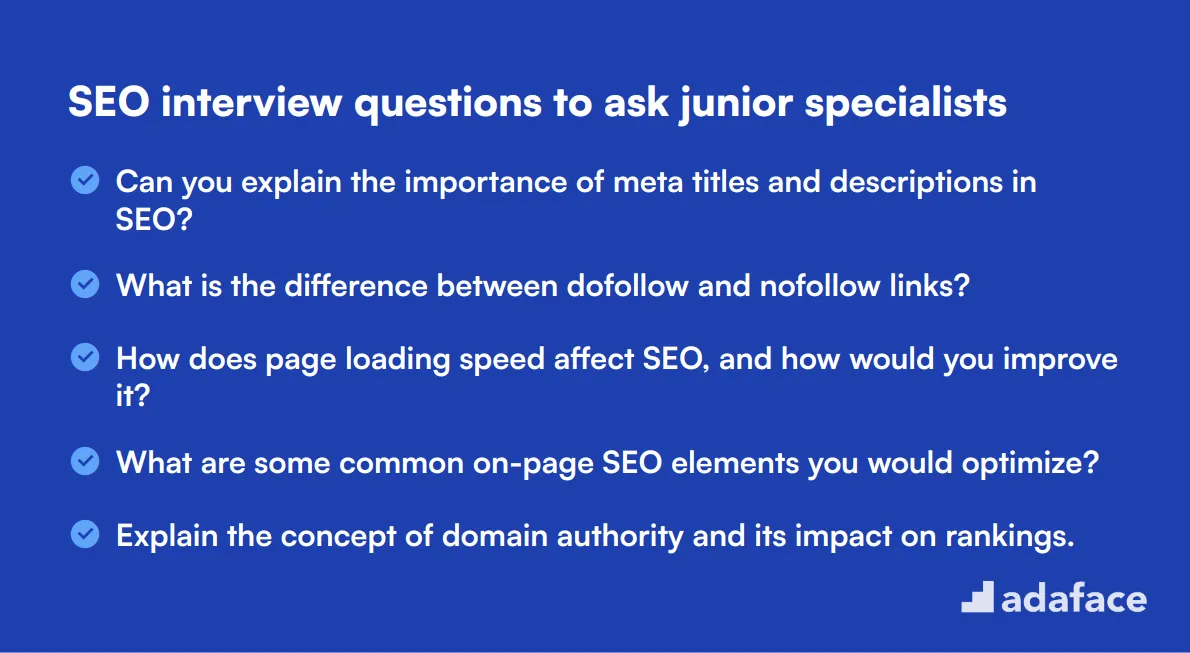
When interviewing junior SEO specialists, it's crucial to assess their foundational knowledge and practical skills. Use these questions to gauge candidates' understanding of basic SEO concepts, tools, and best practices. They'll help you identify promising talent who can grow into valuable team members.
- Can you explain the importance of meta titles and descriptions in SEO?
- What is the difference between dofollow and nofollow links?
- How does page loading speed affect SEO, and how would you improve it?
- What are some common on-page SEO elements you would optimize?
- Explain the concept of domain authority and its impact on rankings.
- How do you determine if a website is mobile-friendly?
- What tools do you use for checking a website's backlink profile?
- Can you describe the purpose of a robots.txt file?
- What is the significance of schema markup in SEO?
- How would you optimize images for better search engine visibility?
- What is the difference between organic and paid search results?
- Explain the concept of keyword cannibalization and how to avoid it.
- How do you approach internal linking for better SEO?
- What is a sitemap and why is it important for SEO?
- How do you identify and fix broken links on a website?
- What is the importance of HTTPS for SEO?
- How would you optimize a website for local SEO?
- Explain the concept of E-A-T in SEO and its importance.
- What are featured snippets and how can you optimize for them?
- How do you use Google Search Console for SEO purposes?
5 intermediate SEO interview questions and answers to ask mid-tier specialists
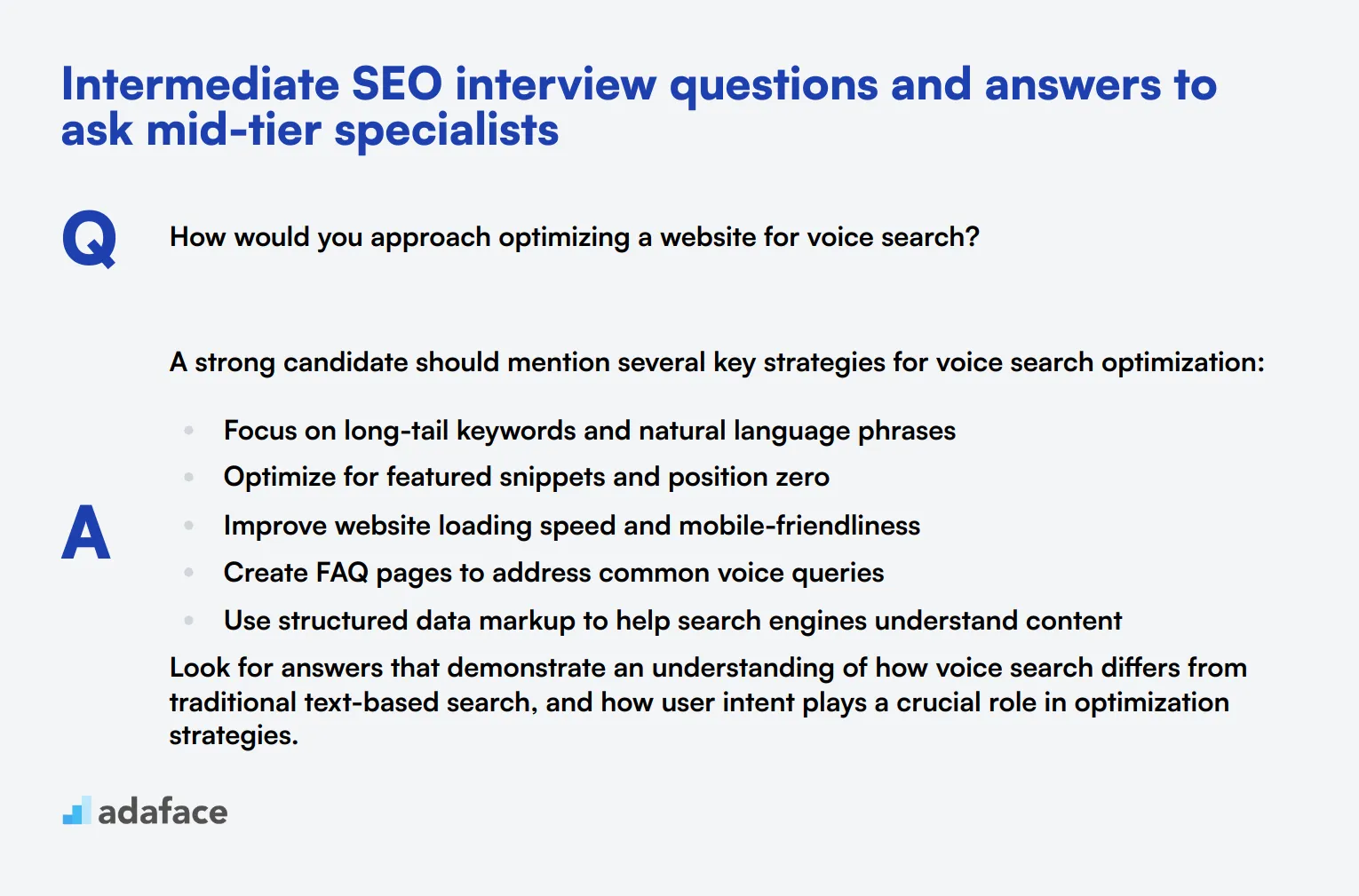
Ready to dive into the world of intermediate SEO? These questions are perfect for assessing mid-tier specialists who've moved beyond the basics. Use them to gauge a candidate's depth of knowledge and problem-solving skills in real-world SEO scenarios. Remember, the best answers often come with a side of practical experience!
1. How would you approach optimizing a website for voice search?
A strong candidate should mention several key strategies for voice search optimization:
- Focus on long-tail keywords and natural language phrases
- Optimize for featured snippets and position zero
- Improve website loading speed and mobile-friendliness
- Create FAQ pages to address common voice queries
- Use structured data markup to help search engines understand content
Look for answers that demonstrate an understanding of how voice search differs from traditional text-based search, and how user intent plays a crucial role in optimization strategies.
2. Can you explain the concept of content pruning and when you might use it?
Content pruning is the process of systematically reviewing, updating, or removing low-quality or outdated content from a website. It's used to improve overall site quality and search engine rankings.
Candidates should mention that content pruning is beneficial when:
- There's a large volume of old, irrelevant content
- Multiple pages are competing for the same keywords
- Thin or low-quality content is dragging down site performance
- There's a need to consolidate similar topics for better topical authority
Look for answers that emphasize the importance of data-driven decision-making in the pruning process, such as using analytics to identify underperforming pages and understanding the potential impact on overall site structure and internal linking.
3. How do you approach international SEO for a website targeting multiple countries?
A comprehensive approach to international SEO should include:
- Implementing hreflang tags to indicate language and regional targeting
- Using country-specific domains or subdirectories
- Creating localized content for each target market
- Optimizing for local keywords and search engines
- Ensuring proper URL structure for different language versions
- Considering cultural nuances in content and design
Strong candidates should also mention the importance of local link building and the potential use of geotargeting in Google Search Console. Look for answers that demonstrate an understanding of the complexities involved in balancing global branding with local relevance.
4. What is semantic search and how does it impact SEO strategies?
Semantic search refers to search engines' ability to understand the context and intent behind a query, rather than just matching keywords. It aims to provide more relevant results by considering the relationships between words and concepts.
Candidates should explain that semantic search impacts SEO by:
- Emphasizing the importance of comprehensive, in-depth content
- Encouraging the use of related terms and synonyms
- Promoting the creation of topic clusters and pillar pages
- Increasing the relevance of structured data and schema markup
- Shifting focus from exact-match keywords to broader topics and user intent
Look for answers that demonstrate an understanding of how semantic search has evolved SEO from keyword-centric strategies to more holistic, topic-based approaches. Candidates should also mention the role of AI and machine learning in improving semantic search capabilities.
5. How would you optimize a website's crawl budget?
Optimizing crawl budget involves ensuring that search engine bots can efficiently crawl and index the most important pages of a website. Key strategies include:
- Improving site speed and server response times
- Using robots.txt to guide crawlers away from unimportant pages
- Fixing broken links and redirects
- Optimizing XML sitemaps
- Consolidating or removing thin or duplicate content
- Improving internal linking structure
- Leveraging URL parameters in Google Search Console
Strong candidates should also mention the importance of monitoring crawl stats and log files to identify and address crawl issues. Look for answers that demonstrate an understanding of how crawl budget optimization can impact indexing and, ultimately, search visibility, especially for large websites.
14 SEO interview questions about on-page optimization
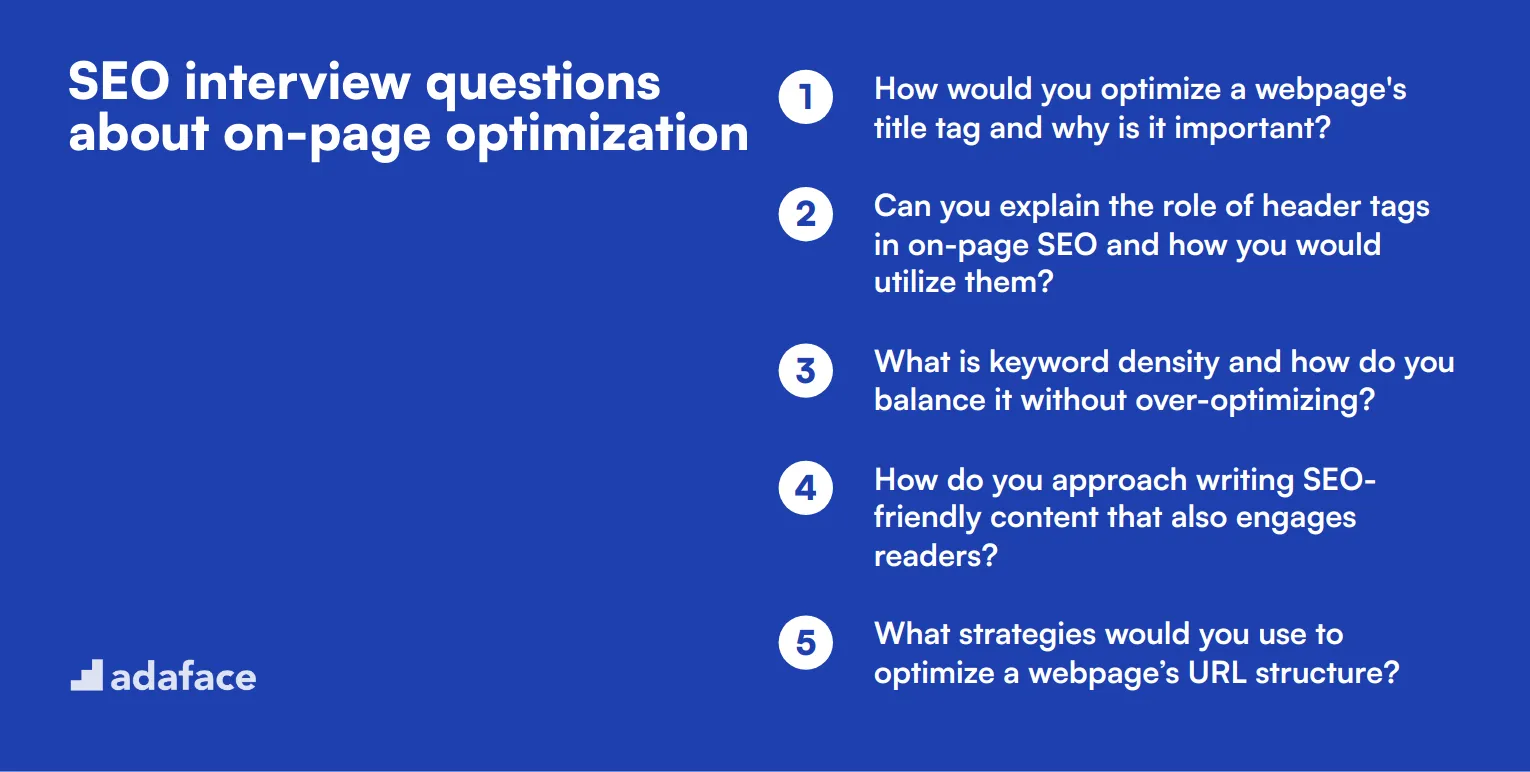
To determine whether your applicants have the right skills to optimize web pages effectively, ask them some of these SEO interview questions about on-page optimization. These questions are designed to assess their ability to enhance a site's visibility and user experience, essential for roles such as SEO Specialist.
- How would you optimize a webpage's title tag and why is it important?
- Can you explain the role of header tags in on-page SEO and how you would utilize them?
- What is keyword density and how do you balance it without over-optimizing?
- How do you approach writing SEO-friendly content that also engages readers?
- What strategies would you use to optimize a webpage’s URL structure?
- How do you ensure that a webpage is optimized for both users and search engines?
- Can you describe the process of optimizing a webpage's internal linking structure?
- How would you go about enhancing the user experience (UX) for SEO purposes on a webpage?
- What is the significance of having a responsive design in on-page SEO?
- How do you handle duplicate content issues on a website?
- What techniques do you use to optimize the meta descriptions of webpages?
- How would you conduct a content audit for on-page SEO improvements?
- Can you explain the importance of using alt text for images?
- What steps would you take to optimize a webpage for a targeted keyword?
9 SEO interview questions and answers related to off-page optimization
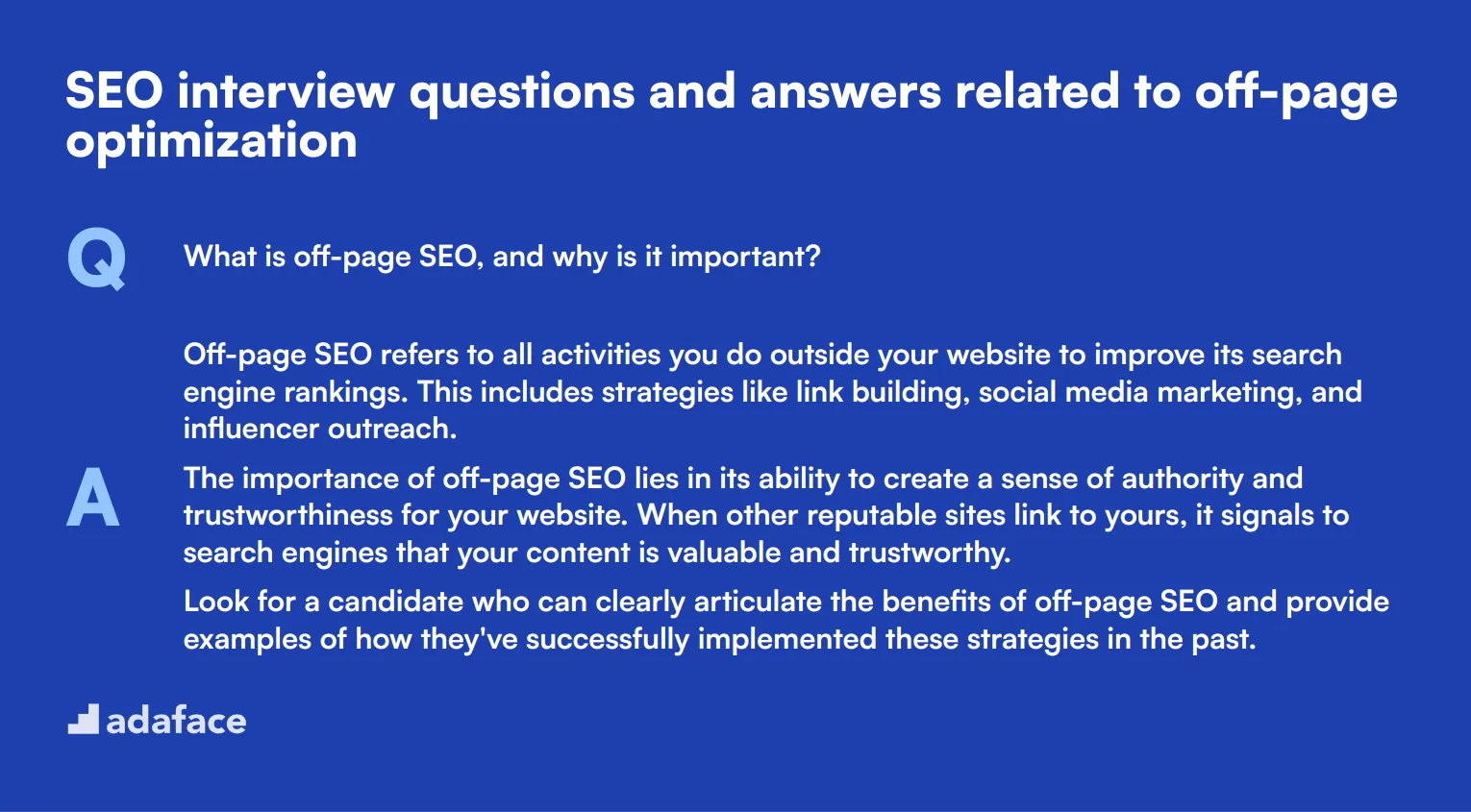
To gauge a candidate's proficiency in off-page optimization, ask them some of these essential SEO interview questions. These questions are designed to reveal their understanding of strategies and best practices that can enhance a website’s authority and ranking beyond on-page factors.
1. What is off-page SEO, and why is it important?
Off-page SEO refers to all activities you do outside your website to improve its search engine rankings. This includes strategies like link building, social media marketing, and influencer outreach.
The importance of off-page SEO lies in its ability to create a sense of authority and trustworthiness for your website. When other reputable sites link to yours, it signals to search engines that your content is valuable and trustworthy.
Look for a candidate who can clearly articulate the benefits of off-page SEO and provide examples of how they've successfully implemented these strategies in the past.
2. How do you approach link building for a new website?
Link building for a new website often starts with creating high-quality, shareable content that other websites will want to link to. From there, outreach to relevant sites and blogs is essential.
Candidates may also mention collaborating with influencers or guest posting on reputable sites as part of their link-building strategy. Additionally, they should be aware of the importance of obtaining links from high-authority domains.
Ideal responses should include specific tactics and a clear strategy for assessing the quality and relevance of potential link sources.
3. What are some effective ways to earn backlinks?
Effective ways to earn backlinks include creating valuable content that naturally attracts links, conducting outreach to industry influencers, and leveraging social media to promote content.
Other methods might involve guest blogging, participating in forums and online communities, or offering to write testimonials for other businesses in exchange for a backlink.
Candidates should demonstrate an understanding of both organic and strategic approaches to backlink acquisition, as well as the importance of relevancy and authority in their link-building efforts.
4. How do you use social media to support off-page SEO?
Social media can be used to amplify content, reach a broader audience, and drive traffic back to your website. Sharing blog posts, infographics, and other valuable content can generate interest and potentially earn backlinks.
Engaging with followers and participating in relevant conversations can also increase your website's visibility and authority. Social signals, such as likes and shares, may indirectly impact search rankings as well.
The ideal candidate should provide examples of successful social media campaigns they've managed and explain how these efforts contributed to their overall SEO strategy.
5. Can you explain the concept of domain authority and how it affects off-page SEO?
Domain authority (DA) is a metric developed by Moz that predicts how well a website will rank on search engine result pages. It ranges from 1 to 100, with higher scores indicating a greater ability to rank.
DA is influenced by various factors, including the quality and quantity of backlinks, the site's age, and its overall trustworthiness. Higher domain authority can lead to better search rankings and increased organic traffic.
Look for candidates who can articulate the importance of domain authority and provide strategies they've used to improve it, such as through link-building and content marketing.
6. What role do online reviews play in off-page SEO?
Online reviews can significantly impact off-page SEO by improving a business's reputation and trustworthiness. Positive reviews on platforms like Google My Business, Yelp, and industry-specific review sites can enhance local SEO efforts.
Reviews also provide fresh, user-generated content that can improve search visibility and click-through rates. Encouraging satisfied customers to leave reviews and responding to feedback can further boost the business's online presence.
Candidates should demonstrate an understanding of how to manage and leverage online reviews as part of a broader SEO strategy, including specific tactics for encouraging and responding to reviews.
7. How do you identify and reach out to potential link-building partners?
Identifying potential link-building partners involves researching relevant websites, blogs, and influencers in your industry. Tools like Ahrefs, SEMrush, and Moz can help find sites that are already linking to similar content.
Outreach typically involves personalized emails that explain the value of your content and how it can benefit their audience. Building genuine relationships and offering reciprocal value can improve the chances of securing backlinks.
Ideal responses should include specific tools and methods used for research and outreach, as well as examples of successful link-building campaigns.
8. What strategies would you use to recover from a Google penalty?
Recovering from a Google penalty involves first identifying the cause, which could be due to unnatural backlinks, thin content, or other violations of Google's guidelines. Tools like Google Search Console can help identify issues.
Once the cause is identified, take corrective actions such as disavowing harmful backlinks, improving content quality, and ensuring the site complies with Google's guidelines. After making the necessary changes, submit a reconsideration request to Google.
Look for candidates who can detail a systematic approach to identifying and resolving issues, as well as demonstrate knowledge of Google's guidelines and best practices for maintaining a penalty-free site.
9. How do you measure the success of an off-page SEO campaign?
The success of an off-page SEO campaign can be measured through various metrics such as the number and quality of backlinks, domain authority, referral traffic, and social media engagement.
Monitoring keyword rankings and organic search traffic can also provide insights into the campaign's effectiveness. Using tools like Google Analytics and Ahrefs can help track these metrics over time.
Candidates should be able to explain how they use these metrics to assess performance and make data-driven decisions for future campaigns. Look for specific examples of how they have measured success in past projects.
Which SEO skills should you evaluate during the interview phase?
While it is true that one interview cannot fully unveil all a candidate's skills, assessing specific SEO-related competencies is essential during the interview phase. These core skills are pivotal in determining a candidate's potential contribution to your SEO efforts and overall marketing strategy.
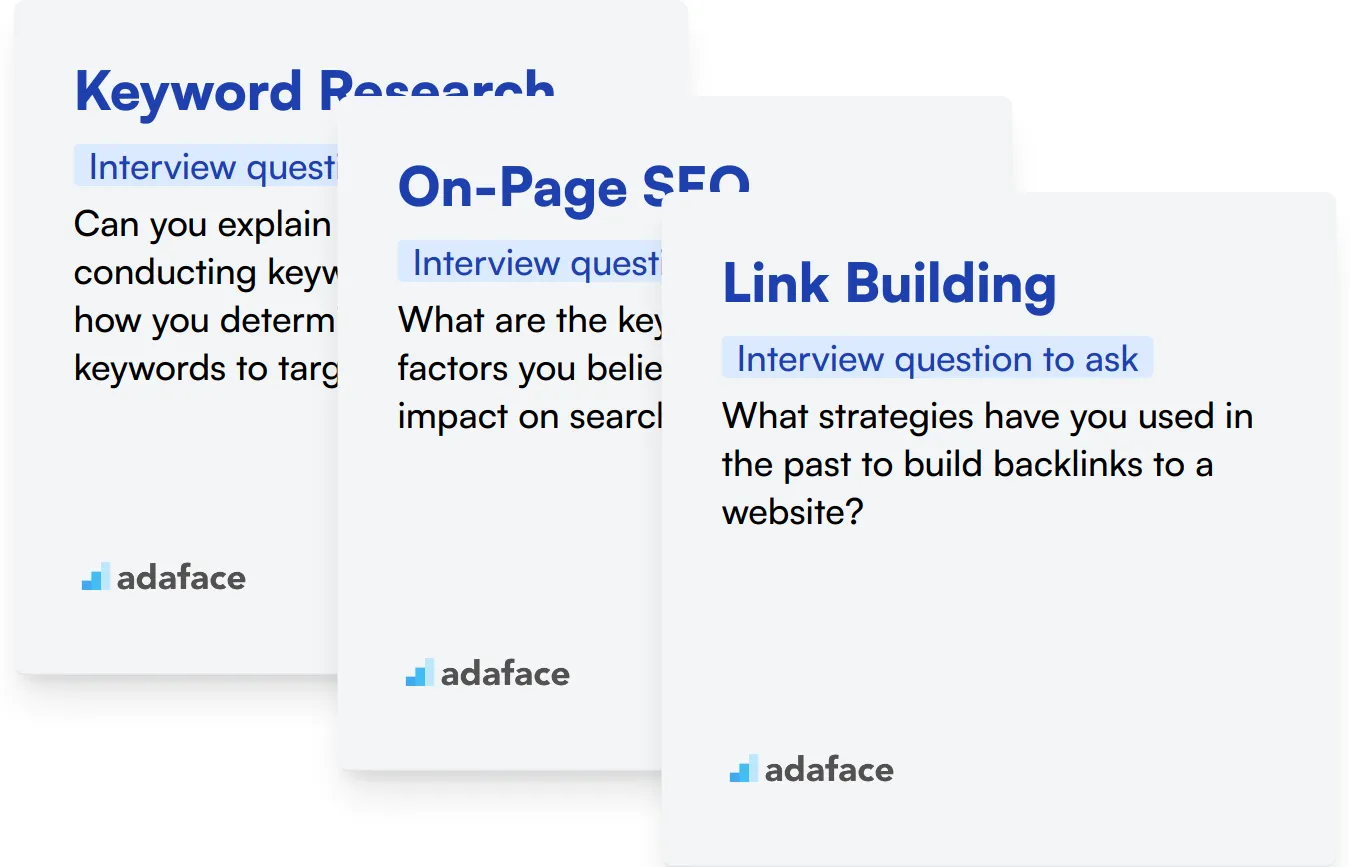
Keyword Research
To effectively assess a candidate's knowledge in keyword research, consider administering an assessment test with relevant multiple-choice questions. You can explore our SEO assessment test to filter candidates based on their keyword research capabilities.
You can also ask targeted interview questions to gauge their expertise. For example:
Can you explain your process for conducting keyword research and how you determine which keywords to target?
When asking this question, look for a structured approach that includes the use of tools, understanding of search volume, competition analysis, and how they incorporate user intent. A strong candidate will provide specific examples from past experiences, demonstrating practical application.
On-Page SEO
An assessment test featuring multiple-choice questions on on-page SEO can help assess a candidate's knowledge in this area. Consider utilizing our SEO assessment test for effective filtering.
Additionally, you can ask them:
What are the key on-page SEO factors you believe have the most impact on search rankings?
When posed with this question, observe if the candidate mentions critical factors such as title tags, meta descriptions, headers, content quality, and internal linking. Their ability to prioritize these elements indicates their understanding of effective on-page SEO practices.
Link Building
To evaluate this skill, consider using an assessment test with relevant multiple-choice questions on link building strategies. Our SEO assessment test covers various aspects of SEO, including link building techniques.
You might also want to ask:
What strategies have you used in the past to build backlinks to a website?
When asking this question, pay attention to the variety of strategies mentioned, such as guest blogging, outreach, and partnerships. Candidates who demonstrate creativity and a strategic approach in their answer likely possess strong link-building skills.
Tips for Effective SEO Interview Questions
Before putting your SEO interview questions to use, consider these tips to make the most of your candidate evaluation process.
1. Start with a Skills Assessment
Begin your hiring process with a skills assessment to quickly gauge candidates' SEO knowledge. This approach helps you focus on the most qualified applicants and saves time in the long run.
For SEO roles, consider using an SEO assessment test to evaluate technical skills. You might also include a digital marketing test to assess broader marketing knowledge.
These assessments provide objective data on candidates' abilities before the interview stage. Use the results to tailor your interview questions and focus on areas that need further exploration.
2. Compile a Balanced Set of Interview Questions
Create a mix of questions that cover various aspects of SEO. Include technical questions, strategic thinking scenarios, and problem-solving situations to get a well-rounded view of the candidate's capabilities.
Consider adding questions about related fields like content marketing or web analytics. This approach helps assess the candidate's understanding of how SEO fits into the broader digital marketing landscape.
Don't forget to include questions about soft skills such as communication and teamwork. These are just as important for success in an SEO role as technical knowledge.
3. Use Follow-up Questions Effectively
Prepare follow-up questions to dig deeper into candidates' responses. This technique helps you distinguish between memorized answers and true understanding of SEO concepts.
For example, if you ask about link-building strategies, a follow-up question could be, "How would you measure the success of this strategy?" This probes the candidate's analytical skills and practical knowledge of SEO metrics.
Leverage SEO Interview Questions and Skill Tests for Effective Hiring
When aiming to hire professionals with SEO skills, verifying their capabilities is key. The most accurate method for assessing these skills is through specialized SEO assessment tests. These tests are designed to measure ability accurately and help ensure candidates meet job requirements.
After utilizing these tests, you can efficiently shortlist the top candidates for an interview. For a seamless hiring process, consider directing potential hires to sign up for further assessment or explore our online assessment platform for more detailed information on managing your recruitment strategy.
SEO Online Test
Download SEO interview questions template in multiple formats
SEO Interview Questions FAQs
Review the job requirements, understand current SEO trends, and prepare a mix of technical and practical questions to assess the candidate's skills and experience.
Look for skills in keyword research, on-page optimization, technical SEO, content strategy, analytics, and staying updated with search engine algorithm changes.
Ask for specific examples of SEO campaigns they've worked on, results they've achieved, and challenges they've overcome in previous roles.
Yes, a practical test can help evaluate a candidate's ability to apply SEO knowledge in real-world scenarios and demonstrate their problem-solving skills.

40 min skill tests.
No trick questions.
Accurate shortlisting.
We make it easy for you to find the best candidates in your pipeline with a 40 min skills test.
Try for freeRelated posts
Free resources




